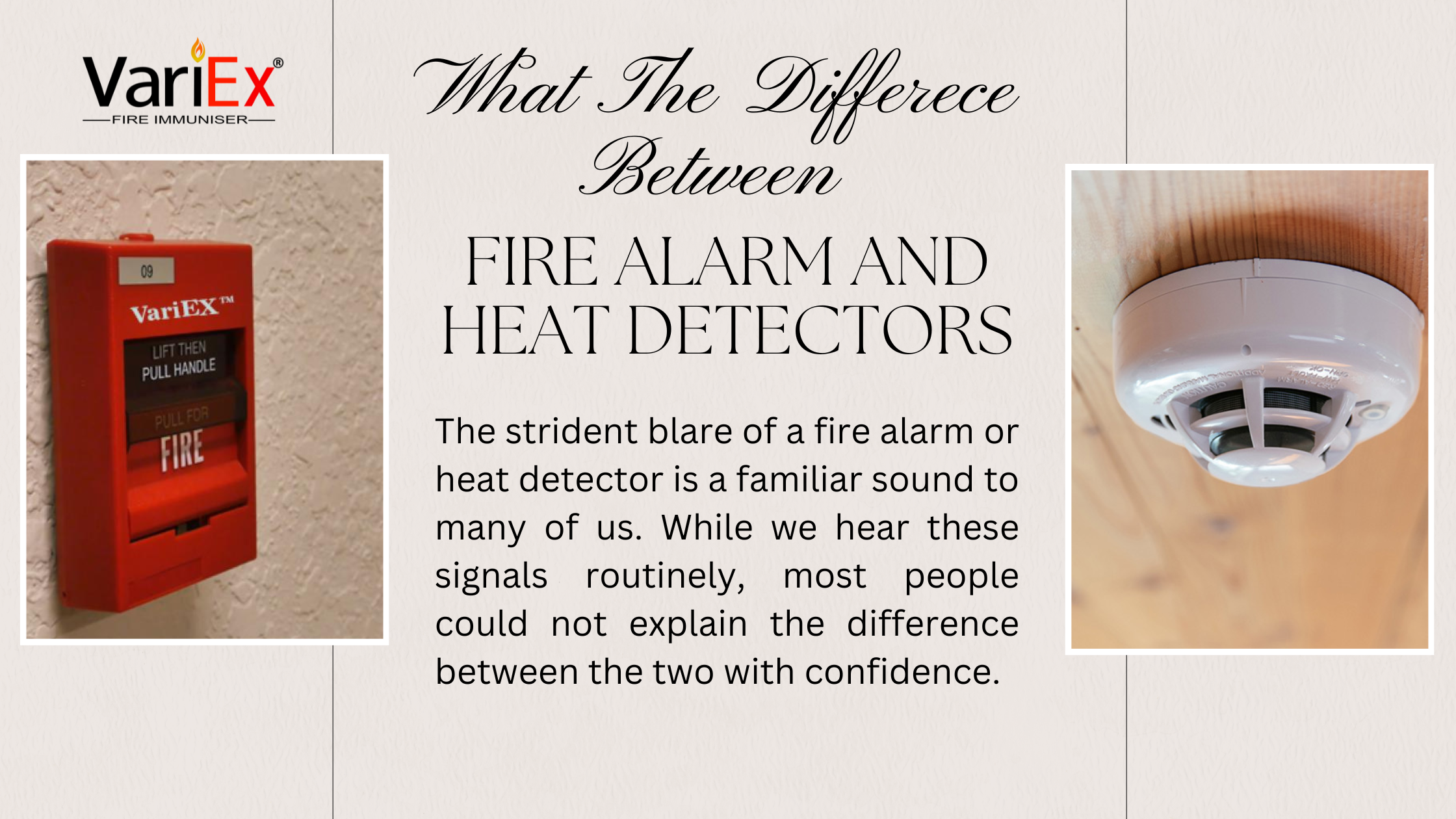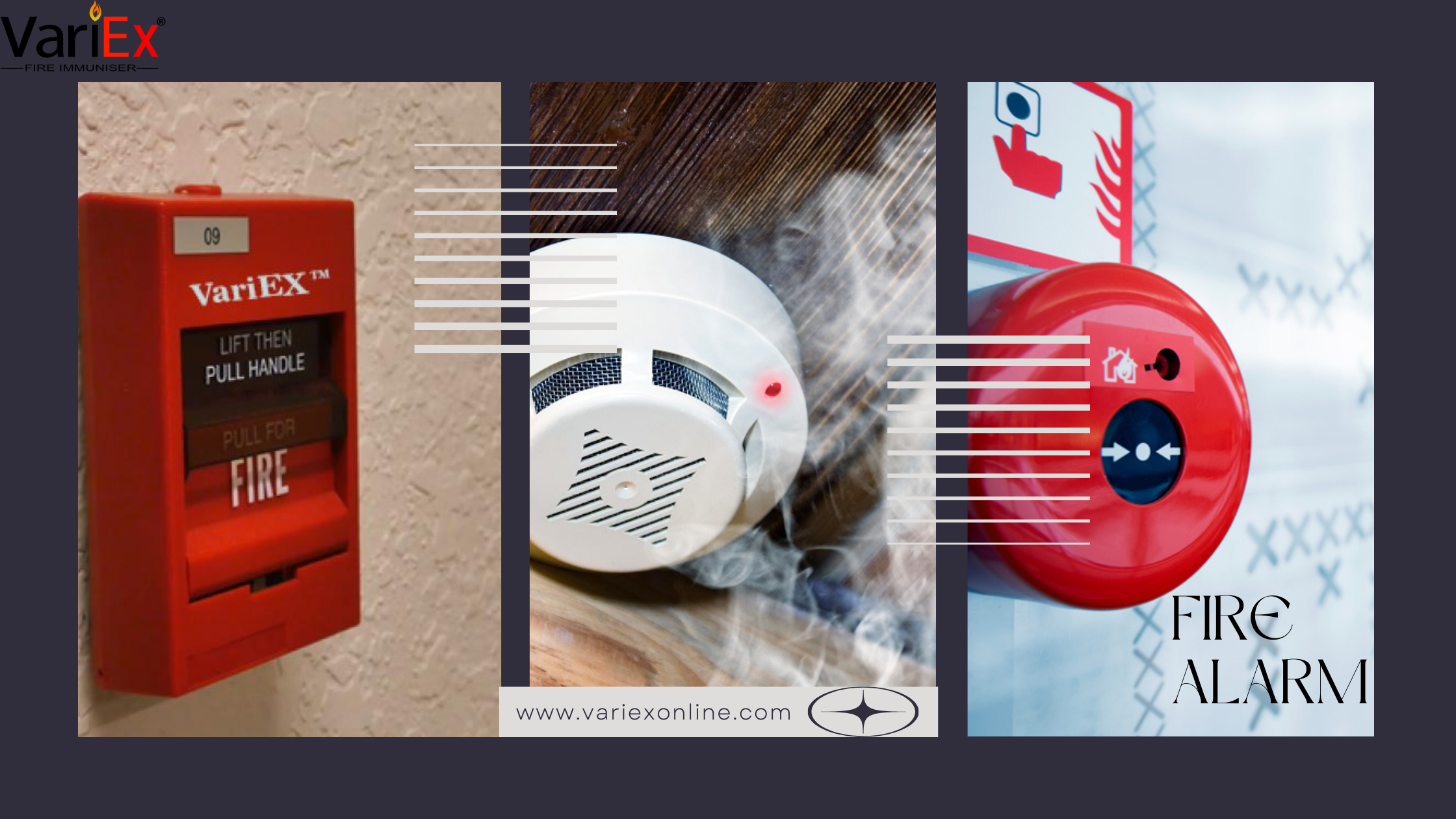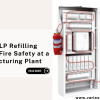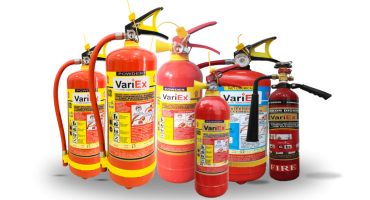![]()
Fire Immuniser
+91-7829629111
Email: info@variex.in
Varistor Technologies Pvt. Ltd.
Block-1, First Floor, Ardente Office One, Hoodi Circle, ITPL Main Road, Bengaluru, Karnataka 560048, IN
What The Differece Between Fire Alarm And Heat Detectors
What The Differece Between Fire Alarm And Heat Detectors
The strident blare of a fire alarm or heat detector is a familiar sound to many of us. While we hear these signals routinely, most people could not explain the difference between the two with confidence. However, although there is a correlation between fire alarms and heat detectors, they are fundamentally distinct systems, serving diverse functions and purposes. This article aims to clarify the differences between these critical safety devices and dispel any confusion.
Differences Between Fire Alarms and Heat Detectors
Feature | Fire Alarm | Heat Detector |
|---|---|---|
Primary Function | Detects fire through smoke, heat, or both | Detects fire by sensing changes in temperature |
Detection Method | Smoke detection, heat detection, or both | Heat detection only |
Common Types | Smoke alarms, heat alarms, combination alarms | Fixed temperature, rate-of-rise |
Usage Locations | Residential, commercial, industrial | Kitchens, garages, areas with high dust/steam |
Sensitivity | Highly sensitive to smoke particles | Sensitive to temperature changes |
False Alarm Susceptibility | Higher (due to cooking smoke, steam, etc.) | Lower (less likely from cooking or dust) |
Alert Mechanism | Audible alarm, visual signals (lights) | Audible alarm, often linked to a central system |
Installation Requirements | Bedrooms, hallways, living areas | Kitchens, mechanical rooms, attics |
| Maintenance | Regular testing, battery replacement | Regular testing, less frequent battery replacement |
| Response Time | Quick response to smoke presence | Slower, reacts to heat buildup |
| Best Use Cases | Early fire detection in living spaces | High-heat areas prone to false alarms from smoke detectors |
| Cost | Generally lower | Generally higher due to specialized use |
| Lifespan | Typically 10 years | Typically 10 years, similar to fire alarms |
| Standards and Codes | Must comply with local fire safety codes | Must comply with local fire safety codes |
| Combination Units | Available (smoke and heat detection) | Rare, primarily focused on heat detection |
| Integration with Systems | Often part of a broader fire alarm system | Can be integrated into broader systems |
| Battery Backup | Commonly included | Commonly included |
An Overview of Fire Alarms
To begin, let's define a fire alarm system. A fire alarm is a system designed and engineered to give audible, visual, or other forms of alarm signals as a result of the presence of smoke, heat, or fire. Such alarms are typically installed in commercial and residential properties to provide early warning to the building occupants in case of fire, giving them precious time to escape.
Fire alarms, also known as smoke detectors, trigger due to the particles produced by combusting materials. The smoke produced during a fire obstructs a beam of light inside the alarm; as the path of light becomes blocked, the alarm goes off. There are two main types of smoke detectors, ionization and photoelectric, and they detect different types of fires. The former is sensitive to fast flaming fires while the latter detects smoldering fires early.
How Heat Detectors Work
Unlike fire alarms, heat detectors are not as common in residential settings but are critical safety devices in environments where the occurrence of smoke isn't necessarily indicative of a fire, such as in kitchens or industrial sites with a lot of dust. Heat detectors serve the same fundamental purpose as fire alarms—to give warning in case of fire—but function differently.
Heat detectors are designed to alarm the presence of unusually high temperatures or rapid changes in temperature. They work in two main ways, either through rate-of-rise detection or fixed temperature detection. A rate-of-rise heat detector will trigger an alarm when the room's temperature increases rapidly within a predetermined range, while the fixed temperature heat detector senses when the heat in a specific area reaches a particular threshold. In other words, a heat detector response to heat, not smoke.
The Distinct Differences Between Fire Alarms and Heat Detectors
The theory that fire alarms and heat detectors are identical is a common misconception. While they both serve to alert individuals of potential fire threats, their mechanisms for detection and the contexts in which they're used differ markedly.
The key difference between a fire alarm and a heat detector lies in what they detect. Fire alarms typically react to the presence of smoke, indicating the early stages of a fire. Meanwhile, heat detectors respond to unusually high temperatures or rapid increases in temperature not necessarily accompanied by smoke. As a result, heat detectors are less likely to trigger false alarms due to cooking, steam, or cigarette smoke.
Another difference lies in where they are commonly installed. Fire alarms are a regular feature in residential buildings, schools, hospitals, and offices—places where a quick evacuation is necessary at the earliest signs of fire. They provide that essential early warning. Conversely, heat detectors are typically found in environments where smoke or dust is part of day-to-day operations, or where high temperatures are a norm—for example, in kitchens, garages, and factories.
Conclusion
In conclusion, both fire alarms and heat detectors play significant roles in fire safety and prevention. Understanding the differences is critical for overall safety and the prevention of property damage and loss of life. However, it is essential to note that neither system is superior to the other—they function in different contexts, and often a comprehensive fire detection strategy will employ both systems.
With this nuanced understanding of fire alarms and heat detectors in mind, homeowners, business owners, and employers can make informed decisions about what types of fire detection and prevention systems are best suited to their specific needs. Fire alarms and heat detectors, when used appropriately, ensure the safety of buildings and, most importantly, the people within them.
Final Say
At VariEx.in and VariexOnline.com, we specialize in supplying and installing top-quality fire fighting systems and equipment. From fire extinguishers to advanced suppression systems, we offer comprehensive solutions tailored to your needs. Our experienced team ensures precise installation and maintenance for optimal safety.
Trust VariEx for reliable fire protection. Contact us online or call 7829629111 to learn more.











